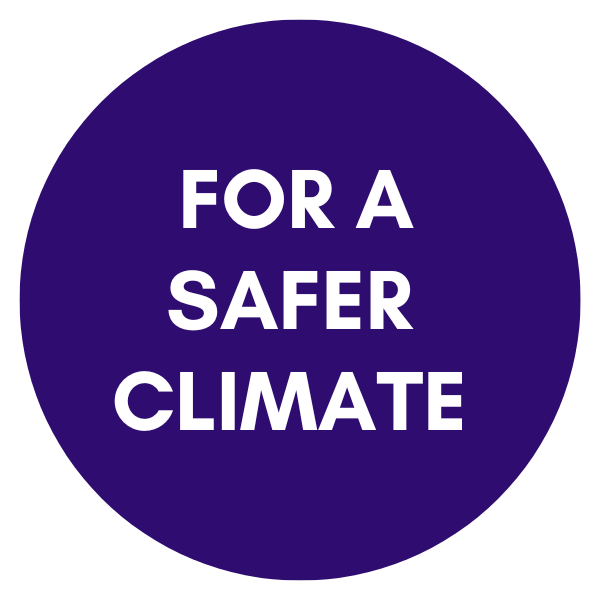An Interview with Theresia Bilola/Think Africa
On recognizing the emotional brain, the need for representation and collaboration for a safer climate
Author: Sahana Subramanian
- For me, a safe climate means that everyone who hears the words ‘climate’ or ‘climate action’ understands what it is, states Theresia.
-A safer climate means that everyone understands their place in taking action and perhaps, inaction, as this too is a choice that one can make. It means that those who decide to be inactive in climate discussions, know the consequences of their decision for themselves, for their immediate neighbors, and for the society at large. This is when there will be a safe space created for talking about climate action.
According to Theresia, one aspect of climate safety is finding spaces where people can sit and talk about climate-related issues without judgement and with an empathetic lens. This is crucial in order to understand why someone’s thought process is the way it is. It is also important for understanding why a person makes a certain decision, be it climate inaction or otherwise.
-If we can create such spaces without judgement, and understand the backgrounds and the cultural reasons as to why people act the way they do, it is a ‘safe climate'.
Recognizing the emotional brain as part of change
An important reason for Think Africa’s collaboration with the Initiative for a Safer Climate (Safer Climate) is encouraging climate discussions between the African diaspora and the rest of the Finnish community, Theresia says. There is also a need for sustainability specialists and climate activists to recognize that the emotional brain can be as important, or even more important than the rational brain when trying to encourage behavioral change. The ‘emotional brain’ goes beyond rational knowledge as it is not enough to just throw figures and facts at people and leave them hopeless.
- We need to make people feel what is climate change, and what will happen if we don’t act. This is the missing piece of the puzzle and a goal that should be achieved, for example, through Think Africa’s involvement with Safer Climate.
According to Theresia, since climate change affects all of us irrespective of our race, gender, and other factors, the discussions need to represent this diversity and be more inclusive. Currently, discussions in Finland do not have sufficient representation of the African diaspora.
-When someone who looks like me, with a similar background, and understands where I come from, approaches me to discuss climate change, it is easier for me to relate, says Theresia. The need for representation is in itself an important reason why we should have collaborations between academia and civil society in general. Civil society is a soft landing spot for reaching people.
Searching of research-based solutions to the effects of climate change
For Theresia, the first goal of the collaboration with Safer Climate is to enable people to use research-based knowledge to support Africa and to spread information about climate change and the climate crisis to the African diaspora in Finland. The second goal would be to support the African diaspora in the Finnish climate discussions and actions.
She states that joint discussions can be a be a starting point for more advocacy and communities and friends beyond Think Africa members.
In addition, the collaboration can help researchers in identifying and developing skills that are necessary in the process of communicating science to different audiences. It is important that researchers pay attention to empathy and understanding to communicate effectively outside academia to communicate without jargon and still reach people.
Climate change effects everyone and Finland is not an exception. Are there any specific ways that climate change-related challenges affect people who are members of African diaspora in Finland?
-In a disaster situation, Theresia says, it is the minorities that are the most affected. This is due to at least two reasons. One is the lack of access to information and the other one is the lower purchasing power of minorities. For example, the African diaspora in Finland face challenges accessing the labor market and this results in lower household incomes on average. Due to lower incomes, there is a tendency to lean more towards unsustainable but affordable lifestyle choices for example, in their diets, mobility, housing, and hobbies. These choices have a direct or indirect impact in the long and short term on their health and well-being. This is a cycle and shows how the African diaspora would be affected by the climate crisis in Finland.
-If we consider only the environment, then you would not see these impacts. But if you look at climate change in a more holistic manner, you can see the extent to which the African diaspora would be affected by climate change.
Theresia adds that the African diaspora is also not always in the same networks as many Finnish natives, so information does not flow easily. This, she says, brings her back to why it is necessary to communicate about climate change to the African diaspora. Such initiatives could help communicate about climate change with other marginalized and minority communities in Finland beyond the African diaspora.
WHAT IS DIASPORA?
The term diaspora refers to a group of people who spread from one original country to other countries. Diaspora is often associated with forced migration that is related to historic, and sometimes traumatic, shared experiences within the group. Diaspora is often understood as a group of people with strong bonds and longing to their (experienced) home country. For example, African diaspora in Finland consists of people from all African countries, as well as their descendants. Diaspora can also be defined in a more narrow way based on e.g. nationality, ethnicity or religion. Diaspora is strongly related to identity and self-definition, and there is no clear-cut definition for it - people in a diaspora always represent a wide variety of views and experiences.


